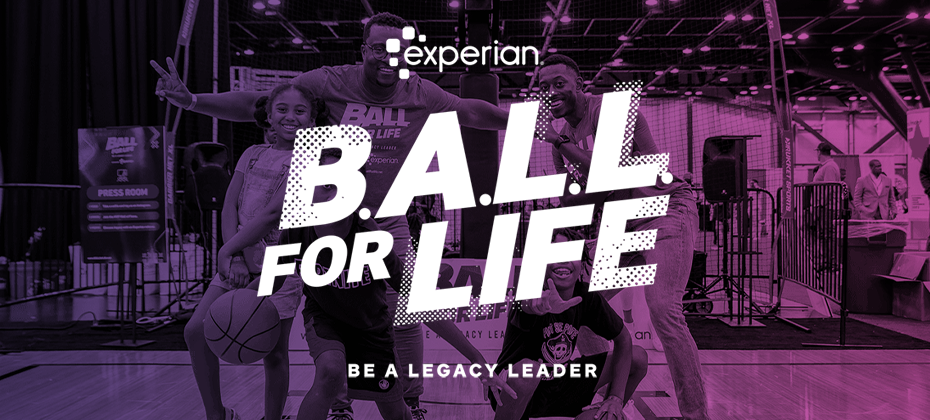Financial Education
One of the largest barriers to financial inclusion is a lack of financial education. Experian is changing that. Our partnerships and initiatives are dedicated to getting the proper tools, resources and information to underserved communities so that consumers can best understand and improve their financial health. Read about our financial education news below:

We believe that financial literacy leads to empowerment. That is why Experian supports initiatives and partners with community organizations to deliver financial education. We also develop products and services that give more control to consumers over their credit profile and financial health. As part of advancing our mission of Financial Power to All®, we are proud to announce we are helping more than 5,000 Hispanic individuals nationwide by relieving $10 million dollars of consumer debt. To provide families with this boost, we joined forces with ForgiveCo, a Public Benefit Corporation (PBC), to administer the acquisition and cancellation of qualifying consumer debt for the selected recipients. Beneficiaries will also receive a one-year premium Experian membership for free that offers access to their Experian credit report in English and Spanish[i], FICO® Score[ii], bilingual educational content, and other financial resources. We hope this effort helps raise awareness of the importance of financial literacy for everyone, and that Experian has resources to help individuals reach their financial dreams. To amplify the message, we collaborated with multi-platinum, award-winning singer and songwriter Prince Royce and you can see his video here. In fact, we have been making a concerted effort the last several years to evolve our educational resources and products to better support all underserved communities. Some of our other activities include the creation of the B.A.L.L. for Life initiative that connects African American and Hispanic youth with financial education, supporting scholarships for Asian Americans through the Ascend organization, providing custom resources for Out & Equal and Born This Way Foundation for the LGBTQ+ community, supporting the NextGen Innovation Lab for Disability:IN, and sponsoring credit counseling for the military community with Operation HOPE. For resources in Spanish, Experian offers a credit e-book and consumers can access a full suite of articles at the Ask Experian blog here. [i] Only Experian credit reports are available in Spanish. All other services associated with an Experian membership are available in English only. English fluency is required for full access to Experian’s products. [ii] Credit score calculated based on FICO® Score 8 model. Your lender or insurer may use a different FICO® Score than FICO® Score 8, or another type of credit score altogether. Learn more.

Even though 26 states now have a personal finance course as a requirement for high school graduation, 40 percent of college students do not feel they have enough knowledge about how to manage money. It’s a challenge that the Center for Financial Advancement® (CFA) Credit Academy addresses with participating Historically Black Colleges and Universities (HBCUs). A collaboration between Experian and HomeFree-USA, the program culminates in the #IYKYK (If You Know You Know) Pitch Competition and a couple hundred new knowledge ambassadors about financial health and credit. Here, competition finalists share their advice for students as they hit campus for a new school year: MALAYA MELTON, Alabama State University Advice I'll give to incoming freshmen is to try to apply for scholarships. It takes some of the burden off. For me, I took about two years making sure that I got the right amount of scholarships before coming to school, because I knew that I wouldn't be able to afford it. My family won't be able to afford it. So, try to be very serious about applying for scholarships, and apply to internships that also get you money that you can use towards school or your personal development. JAZMIN FELIZ ORELLANA, Bowie State University Don't take out loans if you don't have to. I think many freshmen forget that they'll have to pay off those loans once they graduate after a certain time, and that definitely can affect their credit, especially if they're not able to pay for it. OLUWATOSIN OYEKEYE, Alabama State University Save your money, save your money, save your money. It's okay to go to a college in your hometown. Save as much money as you can, because you really don't know where you'll need it. If you get that credit card, make sure that you're paying all the payments on time. Do not wait till the last minute to pay it. PHILIP OMO-TAIGA, North Carolina A&T State University Budgeting. I think that's really what plays into the whole thing of credit, which is there obviously to help you. But it can also go really, really bad. When you think about what it takes to find that healthy balance, you got to learn how to budget because you may go through a period where you're not working. So now it's like, "Okay, now I got to leverage this money that I maybe have saved up. Maybe think about my credit so that I'm not burying myself into a hole. I'm not working, so there's no way I can pay it down." I think when it comes to finding that healthy medium, budgeting is definitely key. CALVIN CHARLES III, Bowie State University A secure credit card. I think freshman year is a great way to enter college (with one) because you're going to have items and things that you are going to have to pay for anyway. Why not begin building your credit there? I can personally say my first credit card I opened at 18, so that gave me the years of credit history. ESANTE-JOY MCINTYRE, North Carolina A&T State University It is never really how you start, but it's how you finish. Freshman year I might not have that scholarship. But I promise you by sophomore year I had $10,000 from outside scholarships, I had $10,000 from doing pitch competitions, $5,000 from here, from there. So, don't give up on the idea of searching. If you are able to search, you'll find it. Those opportunities and resources are out there, and Experian is just a testament to that.

Amid some of the financial challenges that underserved communities experience, members across the financial services community remain committed to championing initiatives and programs that drive greater financial inclusion. In fact, collaboration has led to the inclusion of non-debt related payment information on consumers’ credit profiles, as well as digital services that make it easier to manage money. These efforts have helped to broaden access to fair and affordable financial resources for more individuals. While significant progress has been made, there is still more work to do. However, some of the misconceptions and myths about the financial services community are hindering further advancement. Debunking these myths will accelerate progress by building trust between the financial services community and consumers. Person withdrawing money from ATM contactless Myth #1: “Financial institutions have no interest in underserved consumers or credit invisibles.” The truth is, banks and credit unions want to say “yes” to more prospective borrowers, including individuals and families from underserved communities. Beyond being the right thing to do, it’s an opportunity to potentially build lifelong relationships with a relatively untapped market. A show of good faith to communities who have largely been ignored by the financial system could lead to customer loyalty that may extend to their family and friends. That’s why participants across the financial ecosystem have been proponents of including expanded data sources—such as on-time telecom, utility and video streaming service payments—on to consumer credit reports, as well as exploring other Fair Credit Reporting Act (FCRA)-regulated data sources, including payment data on short-term small dollar loans and expanded public records data. Making this data more accessible to lenders provides a more comprehensive view of a consumer’s ability and willingness to repay outstanding debt—an actionable solution to extending credit to consumers without lenders taking on additional risk. Myth #2: “There is a lack of trustworthy financial education resources.” The financial services community and affiliated organizations recognize that empowering people with financial knowledge and skillset are critical to consumers’ financial success. In fact, banks and credit unions are partnering with nonprofits and non-governmental organizations to better understand the unique challenges and opportunities within specific communities and provide relevant tools and resources. For example, Experian’s B.A.L.L. for Life (Be A Legacy Leader) program, launched in partnership with the National Urban League, serves as a catalyst for engaging with Black communities and low-income youth through live events and digital financial education. Subject matter experts, professional athletes, celebrities, and other influencers share their experiences and expertise, covering topics such as banking, credit, financial management and investing. In addition, to help people improve their financial management, Experian partners with the National Foundation for Credit Counseling (NFCC). The NFCC connects consumers with certified financial counselors to help them address various pain points, including debt management, homeownership, student loans or small business cash flow issues. Myth #3: “Underserved communities have few opportunities to build credit and enter the mainstream financial system.” People from underserved communities, as well as younger consumers and recent immigrants are often excluded from the mainstream financial system because they lack an extensive credit history. Historically, it’s created a vicious cycle; in order to get credit, you have to have credit. Fortunately, there has been a sea change in innovative solutions to address the specific needs of these populations. These include new credit scoring models and microfinancing which provide financial services to individuals who may have been excluded from traditional banking systems. In addition, by incorporating expanded data sources, such as telecom, utility and residential rental payments onto credit reports, lenders have more visibility into consumers who may have been excluded by traditional credit scoring methods.These programs help individuals and families from underserved communities establish and build a credit history that could enable loans, or the ability to rent an apartment or open their dream business. An example is Experian Boost®, a free feature that allows Experian members to contribute their history of making utility, cellphone, insurance, residential rent and video streaming service payments directly into their Experian credit profile. By incorporating nontraditional credit data like paying utility bills on time, online banking transactions, rental payments and verified income data, more people can establish a credit profile that can potentially qualify them for a loan. More Inclusion, Fewer Myths It’s encouraging that community organizations and banks are beginning to see the economic and social benefits of aligning on financial literacy and inclusion. As more initiatives come online, underserved populations will be able to establish a better financial foundation. Then, we can declare the myths to be history.

Caps and gowns. Pomp and circumstance. Loans and debt. As the class of 2024 celebrate their college graduations, more than 43 million of them leave school with a total national debt of more than $1.6 trillion. Some are on better financial footing than others – with no debts as they start their careers – because of early financial and credit education. These learnings fueled ideas for students from Historically Black Colleges and Universities (HBCUs) who competed in this year’s #IYKYK Pitch Competition (If You Know You Know), sponsored by HomeFree-USA and Experian. The challenge: to create solutions that help their peers become debt-free within five years of graduation. Here, finalists share some advice for graduates on how they can start their post-collegiate lives on solid financial footing: OLUWATOSIN OYEKEYE, Alabama State University You're not too young. I feel like most people think it's until you're married or you have kids before you should take your financial life seriously. From your first couple of first paychecks, look into where you can invest. If you don't want to live from paycheck to paycheck, look for ways to grow your money. Take your credit seriously. If you want to own a home, you want to buy a car, these things are important. It's not too early, it’s also not too late to start taking these things seriously. JAZMIN FELIZ ORELLANA, Bowie State University You don't have to start off with a credit card with a $10,000 limit. You can easily start off with a secured credit card. And that's actually one of my biggest pieces of advice. Get a credit card, be mindful with it, don't spend, don't max it out, but definitely just practice and start using it to see if you're actually able to maintain your credit. That's a piece of advice that definitely has worked with me, especially with building up my own credit, which I hope to get soon to 800. MARCUS HARRIS, North Carolina A&T University Always go out and explore opportunities that could first boost your credit and put you in a more financial-free state. For example, with Experian, they have an Experian Boost program that when you're in school, if you have rent, you rent an apartment, you could apply that. Or even the Netflix subscription, you can apply that to the Experian Boost program and therefore you can help build your credit over the time. TAYLOR PAYTON, Bowie State University To college students who are about to graduate, once they get that job offer with a lot of zeros behind it, be mindful of lifestyle influences. Just because you're making a certain amount of money does not mean you have to spend all of it. Be mindful not to keep up with the Joneses. CHIOMA KALU, Alabama State University There's something my sister used to say. She used to say, "Pay now, play later. Or if you play now, you pay later." I feel like if they focus during their youth when they can really do these things and really go out there, do the jobs, focus on paying off everything, getting that financial literacy, getting that financial freedom, and then at age 30 you're already set up for life. That makes more sense than just going through life, just ballin’, and then at the end of the day, if you have to pay when you're like 60? You're still paying student loans? Come on, now. CALVIN CHARLES III, Bowie State University Do not get caught up in social media. Just because you want to live in the city doesn't mean that that's what you have to do. And there's nothing wrong with roommates. They can allow you to reach your actual goals. Every meal does not have to be eaten out. Social media creates a lifestyle that you wish to live, and living in that moment is great, but you have to think about your future and building that wealth for yourself directly afterwards. All of these students were part of the Center for Financial Advancement Credit Academy. To learn more about this program that supports HBCU students, click here.

Like many people, money and personal finance were not topics often talked about when I was growing up. The same was true when it came to credit. In fact, I was raised to believe credit was something to avoid. I didn’t learn credit can be a financial tool to unlock many of the things we want in life until I was much older. This meant I learned a lot about credit and personal finance by making mistakes. And new research reveals this is the case for many Americans. Understanding credit and personal finance is paramount for financial well-being, especially for younger generations navigating today's financial landscape. Yet, against the backdrop of Financial Literacy Month, our new research shows a lack of financial knowledge is leading to costly financial mistakes for many. In fact, our survey of 2,000 adults across the U.S. revealed three in five adults feel their limited understanding of credit and personal finance has led them to make financial mistakes, with 60% of this group stating these mistakes have cost them $1,000 or more. This trend is particularly apparent among younger groups with 71% of Gen Zers and 70% of Millennials claiming their inadequate knowledge of credit and personal finance has come at a price. Twenty-nine percent of Gen Zers and 38% of Millennials report these financial mistakes have cost $5,000 or more. ADDITIONAL KEY FINDINGS INCLUDE: STATEMENT TOTAL GEN Z MILLENNIALS GEN X BOOMERS SILENT I have poor or no understanding of credit and personal finance 12% 18% 14% 12% 7% 0% I want to know more about credit and personal finance 66% 80% 79% 63% 48% 47% My limited understanding of credit and personal finance has led me to make financial mistakes. 60% 71% 70% 61% 44% 24% Financial mistakes I’ve made due to my limited understanding of credit and personal finance have cost me: $5K or more 37% 29% 38% 43% 33% 38% $1K or more 60% 58% 63% 64% 52% 63% $10K or more 23% 12% 22% 31% 24% 38% I learned about credit and personal finance: Through online research 32% 25% 36% 35% 27% 32% In school, college or community classes 33% 35% 26% 35% 35% 38% From a parent of family member 36% 31% 30% 38% 42% 47% Social media in some form 30% 52% 47% 24% 7% 0% I believe personal finance should be a required course in high school. 78% 72% 72% 81% 85% 88% I believe access to credit plays a significant role in my overall financial health. 80% 77% 82% 81% 78% 88% Bridging the Knowledge Gap These statistics underscore the importance of ongoing financial education. It's evident there's a strong desire among individuals, especially younger generations, to enhance their understanding of credit and personal finance. However, without adequate knowledge, many are susceptible to making costly financial mistakes. Navigating the mainstream financial system has its complexities, and if consumers don’t have a baseline understanding, it can be overwhelming. At Experian, we're committed to bridging this knowledge gap and empowering individuals to take control of their financial futures. We offer a range of free tools and resources designed to educate and empower consumers, including: Free Credit Reports: Gain insight into your credit history and monitor your financial health with a free copy of your Experian credit report and FICO Score®[1]. You can access these through our free mobile app or our website. Credit Monitoring: Stay informed about changes to your credit report and receive alerts about potentially fraudulent activity as part of our free Experian membership. Educational Resources: Check out our official credit advice blog, Ask Experian, where you'll find answers to common questions and expert advice on credit-related topics. Experian Boost®: Take advantage of this innovative tool to potentially improve your credit scores by adding positive telecom, utility, and other payments to your credit file.[2] Experian Go™: If you're new to credit, our mobile app offers a free membership to help you establish and build credit responsibly. Join Us in Celebrating Financial Literacy Month I also encourage consumers to join Experian’s weekly #CreditChat hosted by @Experian on X with financial experts every Wednesday at 3 p.m. Eastern time. In recognition of Financial Literacy Month, consumers can learn personal finance basics from experts each week on topics, including budgeting, savings, credit and debt, and more. Survey Methodology Experian commissioned Atomik Research to conduct an online survey of 2,005 adults throughout the United States. The makeup of the sample is representative of the U.S. population based on national census data regarding demographic variables such as gender, age and geographical regions. The margin of error for the overall sample is +/- 2 percentage points with a confidence level of 95 percent. Fieldwork took place between March 17 and March 21, 2024. [1] Credit score is calculated based on FICO® Score 8 model, unless otherwise noted. In addition to the FICO® Score 8, we may offer and provide other base or industry-specific FICO® Scores (such as FICO® Auto Scores and FICO® Bankcard Scores). Your lender or insurer may use a different FICO® Score than FICO® Score 8 or such other base or industry-specific FICO® Score (if available), or another type of credit score altogether. Learn more. [2] Results will vary. Not all payments are boost-eligible. Some users may not receive an improved score or approval odds. Not all lenders use Experian credit files, and not all lenders use scores impacted by Experian Boost®. Learn more.

While cheering on your favorite tournament team during March Madness, basketball fans can become MVPs in financial literacy with Experian’s B.A.L.L. for Life™ (Be a Legacy Leader) gesture-controlled game. On the virtual court, the game can help students create their own shining moment in their financial health journey. The B.A.L.L. for Life program helps young adults and their families set up a game plan to building generational wealth; the gesture-controlled game tests players’ knowledge about credit. Credit and financial coaches teach the basics of budgeting, saving, credit, investing, homeownership and more. B.A.L.L. for Life debuted at the 2023 Iverson Roundball Classic, for which Experian has supported as the exclusive financial literacy partner since 2022. Back then, a younger Cason Wallace (now with the Oklahoma City Thunder) talked with our Chief Diversity and Talent Acquistion Officer Wil Lewis and Experian partner and recording artist Lecrae about the importance of understanding money matters. B.A.L.L. for Life serves as a catalyst for engaging with young adults and people who are credit invisible through live events and digital financial education. It powers in-person experiences such as the #IYKYK Pitch Competition (If You Know You Know) featuring HBCUs across the country, and The Legacy League Game Show which was part of the National Urban League’s 2024 Empowerment Summit. B.A.L.L for Life kicked off its college tour in November at the University of Texas San Antonio; Shaw University and Morgan State University will be its next stops in April. To learn more about B.A.L.L. for Life™, visit experian.com/legacy.

By the time Vikki Nunnery decided to join the U.S. Army, she was almost finished with her nursing degree. It was her senior year, on the cusp of achieving her Bachelor of Science. A professor piqued her interest in the military. “One of my instructors was an LPN. She deployed and did a presentation about being a nurse in the army. I came in (to the Army) as a registered nurse (RN) and am now a nurse practitioner,” Nunnery said. Now Lieutenant Colonel Nunnery, DNP, is married to a fellow military member, has two children and has been on active duty for 17 years. Between student loans and credit cards, she also accumulated a lot of debt. “We never talked about (money) at home. My family never talked about managing money,” Nunnery said. “Being married with kids, I’m trying to be more financially responsible for the future.” Experian and Operation HOPE are helping Nunnery do just that. She is a client of the expansion of its partnership, which offers new, no-cost dedicated resources specifically for active duty members, veterans and military families across the country. The program provides financial coaching and wellness, credit education and financial disaster preparedness. The unique circumstances of the military community impact their finances more than the general population. A survey shows servicemembers and their spouses have more difficulty paying some monthly bills and finding economic assistance because of overseas deployments and frequent moves, combined with rising inflation. “(This work) is personal. I’ve been working around military communities for over 10 years. I know the challenges,” said Jessica Hamel, financial wellbeing coach for Operation HOPE Inside Experian program. Hamel is a Gold Star sister and military spouse. Her husband’s divorce and her brother’s passing had negative financial impacts on their respective families. “Often with some of our younger soldiers, younger service members, they haven’t had life experience in terms of needing to budget. We have members of the military right now right out of high school and there’s not a lot of experience managing their own money. They’re quickly thrust into a place where they don’t have a support system to do that,” Hamel said. “What we see at some major bases is a lot of predatory financial institutions – payday lenders, title max loans, pawn shops, buy-here-pay-here dealerships.” "We have members of the military right now right out of high school and there’s not a lot of experience managing their own money. They’re quickly thrust into a place where they don’t have a support system to do that." Without a foundation of money management know-how, as service members move up in rank and earn more money, their habits can follow. Hamel stressed the importance of helping clients establish a foundation of knowledge and provide tools to help them address specific financial situations and their future. “Clients know they need to do something different than the way they grew up, but perhaps they grew up in generational poverty and they’re using the military to secure a job immediately, get job experience or support. They can make a great living in the military,” she said. “They don’t know what they don’t know, but they know they don’t have all the right information.” With Hamel’s guidance, Nunnery has set up a budget and developed habits that have led to increased savings, saving for a house, and a bump in credit scores. Hamel is also exploring whether Nunnery qualifies for public school loan forgiveness. The couple is planning to pass on these lessons to their kids, starting with opening their own checking accounts, and teaching them how to save, budget, and the importance of credit scores. “Without Jessica, we’d still be living paycheck to paycheck. I wasn’t paying attention to my accounts. I was just spending and spending,” Nunnery said. “Little things like a budget, where our money is going - she really helps us focus on these things. That’s really good support.” “We have so many people who haven’t learned about credit and then get blamed for a game they never got the rules to,” Hamel said. “I’m honored to be the coach for this program.” For more information about financial coaching and resources for servicemembers, military family or veterans, contact Jessica Hamel at Jessica.hamel@operationhope.org.

Ball pits, a video game and a neon-pink house might not be what typically comes to mind when you think of our mission of financial inclusion. But that’s some of the ways Experian spent its summer sharing resources and information to empower underserved communities. FINANCIAL INCLUSION AND INNOVATION It was our second year as the exclusive financial literacy partner. In partnership with the National Urban League, we introduced this program to the athletes and their families participating in the all-star weekend. We also created a gamified app that enables users to shoot hoops using gesture controls as they learn about credit and financial tools. Experian’s partnership with UnidosUS includes support for its Financial Empowerment Network (FEN), a program, which offers free, individualized, culturally-relevant support to Latino families. Our colleagues shared credit education resources and their journeys to financial health at the national conference. We are… financially fierce! As a proud sustaining Titanium partner of Out & Equal, we brought The House of Experian to this year’s Workplace Summit. Hundreds visited the eye-catching attraction to learn about financial and credit tools. We also led engaging conversations about money matters for the trans community and dove deep into the financial wellness of LGBTQ+ consumers and entrepreneurs. To learn more about the gaps and needs of the community, we’ve launched a financial wellness survey in partnership with Out & Equal. COMMUNITY ADVOCACY The mental health and wellness of our teammates is a priority for Experian, and it was a big topic of panel discussions at the Disability:IN Annual Conference. Empowering Asian American and Pacific Islander (AAPI) professionals is the focus of the annual Ascend Leadership Convention. This year’s theme was “I Ascend,” encouraging participants to share how they navigate and succeed in their careers. At Essence Fest’s National Urban League Women’s Empowerment Luncheon, Victoria Crain, Experian’s vice president of global compliance and governance and co-executive sponsor of our Black Professionals Employee Resource Group, shared keynote remarks about courage and legacy. EMPOWERING THE NEXT GENERATION

In a world where financial stress affects the majority of adults, it’s easy to feel overwhelmed and isolated. The good news? You're not alone, and there's a way out. Why it matters: Our recent research sheds light on the prevalence of financial stress among U.S. adults. Nearly 70% of adults feel they have suffered or are currently suffering from financial trauma. This research highlights the urgent need for increased financial education and planning. In addition to job loss, financial fallout from the pandemic, or other economic challenges, a lack of discussion about money growing up and limited access to trustworthy information about finances may be two factors contributing to financial stress: More than half (51%) stated their family rarely or never spoke about finances. This lack of discussion left 43% of those who rarely or never spoke about finances growing up feeling like they never learned about financial planning and 42% stating they never learned to use credit or build their credit scores. 37% of adults are unaware of where to access trustworthy information about financial literacy. So, how can we alleviate financial stress? While reducing financial stress will take a multi-faceted approach and will, in many ways, depend on a consumer’s unique financial situation, our survey revealed a common theme: more education would help consumers feel better about their financial situation. A majority (55%) said access to more financial education would help alleviate their financial stressors. In addition, 45% believe establishing a more concrete financial plan for their future would reduce their financial anxieties. Experian’s free tools and resources Education is central to our mission and we are committed to connecting consumers with tools and financial resources to live more financially empowered lives. If you’re battling financial stress, seeking financial education or working on building a financial plan for your future, here are a few ways we can help: Experian Boost®: Consumers can add positive telecom, utility, video streaming service and qualifying rent payments to their Experian credit file for an opportunity to improve their credit scores by visiting experian.com/boost.[1] Experian Go: Consumers without an established credit history can download Experian’s mobile app and enroll in a free Experian membership to establish, use and build credit responsibly with Experian Go. Experian Smart Money: Earlier this month, Experian released the Experian Smart Money™ Digital Checking Account & Debit Card[2] that embeds Experian Boost. Now it is even more convenient for consumers to use Experian’s feature and improve their credit profile, while also benefiting from an industry-leading suite of financial tools all in one place. Experian’s official credit advice blog, Ask Experian, has answers to common questions, advice and education about credit. Consumers can find additional credit education resources at http://www.experian.com/consumereducation. Free credit monitoring and alerts: consumers can sign up for credit monitoring and receive a free copy of their Experian credit report and FICO Score®[1] monthly at experian.com or via Experian’s mobile app. Experian’s mobile app also offers access to personal finance and credit building tools such as: Industry collaboration is key The onus to overcome financial challenges and stress does not fall solely on consumers. As a financial services community, we have a responsibility to make financial education materials available to consumers. Each of us holds a different piece of the puzzle. For instance, we’ve long partnered with organizations dedicated to helping consumers navigate and overcome financial challenges, including the National Foundation for Credit Counseling (NFCC). The NFCC has personalized resources available to help consumers, including 1:1 credit counseling. Consumers can receive one-on-one support from one of over 1,200 certified financial counselors at 250 locations across the U.S. to establish debt relief plans through the NFCC by visiting: https://www.nfcc.org/ By fostering collaboration among various stakeholders, including nonprofits, community leaders, credit bureaus, and other financial institutions, consumers can gain a comprehensive understanding of the different components of the financial system. Additional key findings include: Methodology Experian commissioned Atomik Research to conduct an online survey of 2,001 adults throughout the United States. Researchers controlled for demographic variables such as gender, age, geographic region, race and ethnicity in order to achieve similar demographic characteristics reported in the U.S. census. The margin of error of the overall sample is +/-2 percentage points with a confidence level of 95 percent. Fieldwork took place between August 22 and August 28, 2023. Atomik Research is a creative market research agency. 1 Credit score is calculated based on FICO® Score 8 model, unless otherwise noted. In addition to the FICO® Score 8, we may offer and provide other base or industry-specific FICO® Scores (such as FICO® Auto Scores and FICO® Bankcard Scores). Your lender or insurer may use a different FICO® Score than FICO® Score 8 or such other base or industry-specific FICO® Score (if available), or another type of credit score altogether. Learn more. 2 Results will vary. Not all payments are boost-eligible. Some users may not receive an improved score or approval odds. Not all lenders use Experian credit files, and not all lenders use scores impacted by Experian Boost®. Learn more. 3 The Experian Smart Money Debit Card™ is issued by Community Federal Savings Bank (CFSB), pursuant to a license from Mastercard International. Banking services provided by CFSB, Member FDIC. Experian is a Program Manager, not a bank.